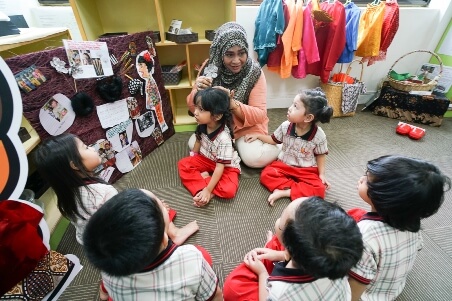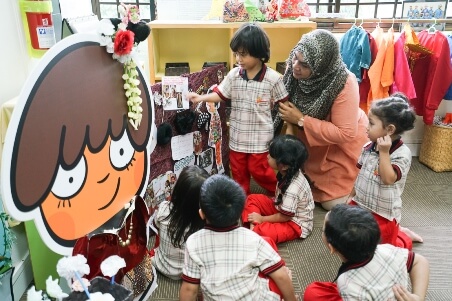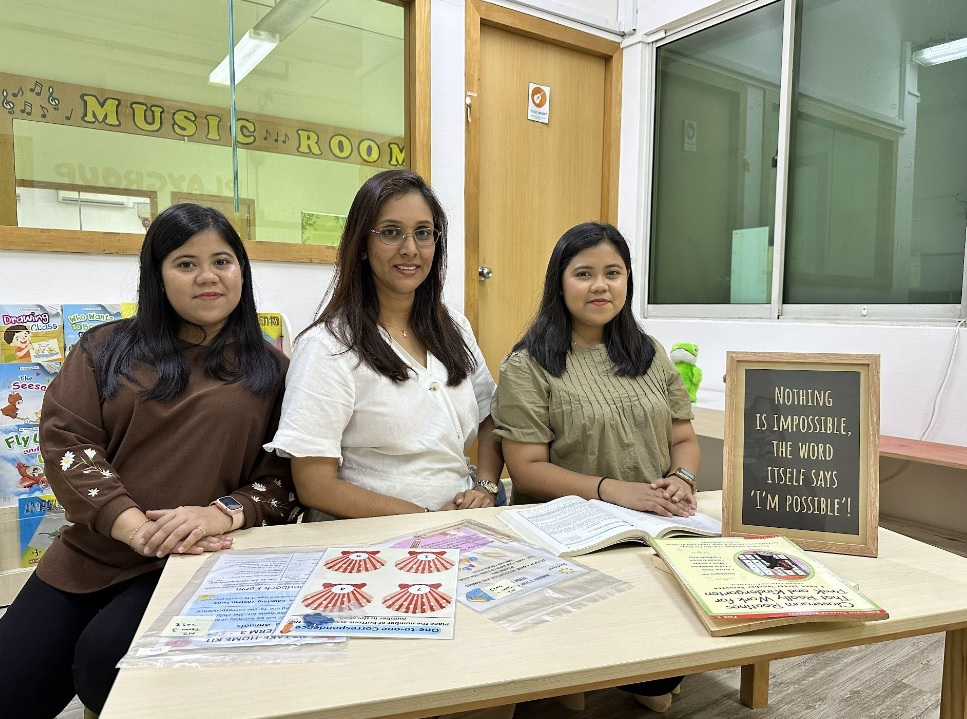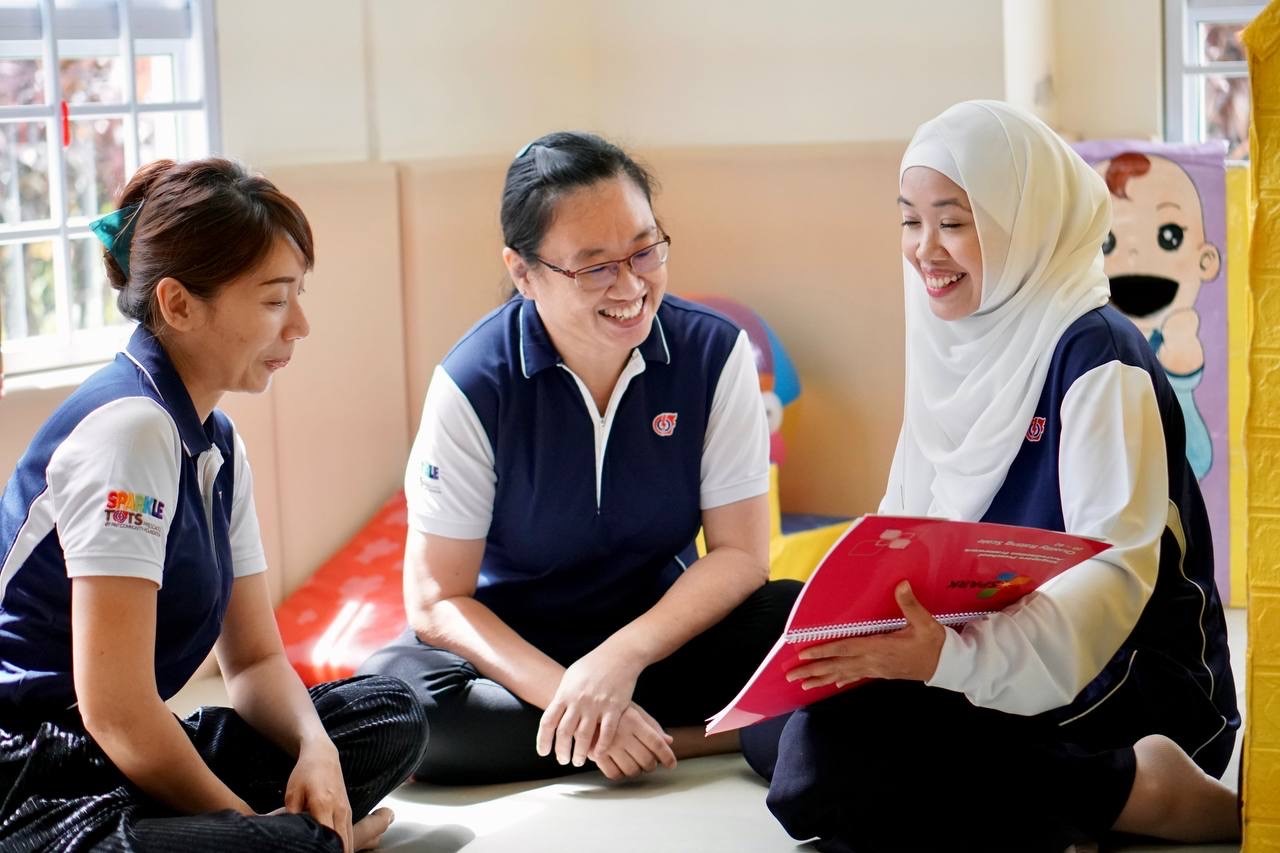Paying It Forward One Protégé at a Time
Well-known among her colleagues for her keen leadership skills and mentoring role, Mdm Zulaihabe Talip, Senior Principal at PPIS Child Development Centre at Bukit Batok is a strong believer in sharing her knowledge and experience with the early childhood sector and providing necessary support to help new early childhood educators progress in the sector.

Mdm Zulaihabe Talip, Senior Principal, PPIS Child Development Centre at Bukit Batok
Madam Zulaihabe Talip is well-known among her colleagues, children and their parents for her keen leadership skills, and for her role as a mentor to other Early Childhood (EC) educators.
The 49-year-old senior principal from PPIS Child Development Centre (PPIS) – Bukit Batok believes in sharing her knowledge, amassed from 25 years of experience in the EC industry. She has been mentoring other EC educators, who have become mentors in their own right.
Madam Zulaihabe’s centre was nominated for a mentorship programme under the “Singapore’s Little Treasures Mentor-Initiative”, one of three initiatives under the Early Childhood Development Agency (ECDA) Innovation Projects, in partnership with the National Heritage Board (NHB). Recently the centre was awarded the School Heritage Champion Award 2017 by NHB.
Part of the Mentor-Initiative includes a platform for participating centres to share their experiences and knowledge with other early childhood educators. For Madam Zulaihabe, this programme enabled her to put her mentorship skills to use. To maximize the impact of her mentorship efforts, Madam Zulaihabe adopted a “Pay it forward” approach to mentoring – her mentees, especially those on the leadership track, were given opportunities to mentor other educators.
She said: “I felt that rather than doing all the mentoring myself, or waiting for them to complete mentoring courses, I wanted to spread my knowledge to my mentees and have them go out there and help other educators.”
Madam Zulaihabe sometimes records her mentees’ sessions with the educators whom they are simultaneously mentoring, so that they can do a detailed post-session review and analysis together.
She said: “By videoing their sessions, we get to assess the educator’s body language, the children’s responses, and whether the children are enjoying their teaching. My mentees sometimes video their own mentees from other centres as well, with the good intent of assessing their skills.”
Describing her passion for mentoring, Madam Zulaihabe said: “Mentoring holds a special place in my heart. I have realized that when we are lost, it helps when there is someone to highlight our potential to us. To me, that is the role of a mentor – To inspire, motivate and guide.”
Madam Zulaihabe acknowledges that it can be tough starting out in the Early Childhood sector, especially if there is a lack of support for new educators. With that in mind, she initiated a mentorship programme in her centre to guide both new and experienced educators, equipping them with the skills they need to advance in their careers.
 |  |  |
Today, the programme has exceeded her expectations as she now also mentors new principals and vice-principals within the organisation. She has also been mentoring trainee teachers from Ngee Ann Polytechnic/Seeds/Asian International College on their practicum.
“Having been new to the job once myself, I know the feeling of having little support. The transition can sometimes get overwhelming. I feel that it is important, especially for the new teachers, to know that there is someone who can help them,” said Madam Zulaihabe.
She also advises all early childhood educators to ensure that they keep their passion for early childhood education burning strong. To Madam Zulaihabe, early childhood is about nurturing and moulding the young minds. Being in this field often means that they have to go “above and beyond just teaching”.
The mentorship that Madam Zulaihabe took up is part of her effort in developing her professionalism. This includes developing, evaluating and implementing programmes, handling parent and community communications, among other daily tasks.
However, she believes that dedicating time to mentoring educators would benefit not just herself, but other practitioners in the sector - especially those who are keen to embark on the leadership pathway.
“I embarked on this mentorship journey as I believe that it is a responsibility that I, as a leader, can undertake... Managing time is not easy. It can be a challenge, both for my mentees and I, but we do our best to make it work. It helps when you and your team of teachers are all working towards the same goals. We sometimes have our meetings outside working hours, but we understand the need for them,” she said.
Describing her mentoring approach as one which pushes her protégés to “think out of the box”, Madam Zulaihabe shared that she likes to challenge them by donning different thinking caps when dealing with any situation.
“For example, whenever I empower my mentee with a big project, I will guide them to think beyond what they already know. I will get them to think from the viewpoint of a parent, child, principal, so that they have the ability to comprehend things from different perspectives,” said Madam Zulaihabe.
In one of the recent projects - a Malay Heritage Gallery - that her mentees took charge of, Madam Zulaihabe encouraged them to think beyond just simply decorating a classroom. She guided them to draw inspiration from the Malay Heritage Centre. The result of their efforts was an eye-catching and enriching display filled with a variety of traditional Malay items. This project helps the children keep in touch with their culture and enjoy the process of learning the Malay Language.
 |  |
Early childhood educators who have been under Madam Zulaihabe’s wing say they have benefited greatly. Ms Raha Abdul Razak, 51, a senior teacher with 19 years of experience, describes her mentor as a “visionary leader”.
Said Ms Raha: “It has been a great experience being mentored by Madam Zulaihabe. She has a lot of ideas and would present them in a way that we can easily understand. She would also guide us to make an idea become a reality. She has taught me how to have a ‘helicopter view’ of situations.”
Ms Raha described Madam Zulaihabe as a principal “who is always hands-on in her mentoring”. Under her mentorship, Ms Raha was given opportunities to organise major centre events, such as Family Day and Sports Day. Madam Zulaihabe had guided her on the planning and implementation of the events, and even on how to form community partnerships and secure sponsorships.
Ms Raha said: “Madam Zulaihabe communicates her ideas with clarity. For the Family Fun Day event, we used to do it on a small scale, but this time, she decided to make it bigger, through engaging parents and the community.
“We formed a committee to plan and implement the event. Madam Zulaihabe would sit in our committee meetings to lend her support, ensuring that we received the necessary direction and guidance to help make the event a success.”
 |  |
Fellow educator, Ms Razanah Abdul Razak, added that Madam Zulaihabe has the ability to always look at the bigger picture – a skill which she hopes to emulate in her own career.
“She has the ability to look at things broadly, and also possesses the ability to pick up minor details. She would also always remind her staff about the ripple effect and ensure that good practices are always being carried out at the centre,” said Ms Razanah.
Moving forward, Madam Zulaihabe hopes to see more centres carry out mentorship programmes. There can be a lot of fun, and they could serve as a platform that allows both mentors and protégé to have greater appreciation for one another and the work they do.
She also encourages consistency and an open mind, as these would facilitate effective two-way communication and create an even more positive work environment in the long run.
Madam Zulaihabe advised, however: “Mentoring is not always a smooth journey. Often, there are difficult decisions to be made by both parties, issues which most people would rather not face. As much as I’m going through the process of developing others, I am also developing my own professionalism through the mentoring process. As a mentor, it is important to be there for your mentees. A mentor’s presence – whether you are there as a resource, sounding board, or simply just being physically present – could make the difference between success and failure for the mentees.”
.jpg?sfvrsn=2c6017e2_3)





